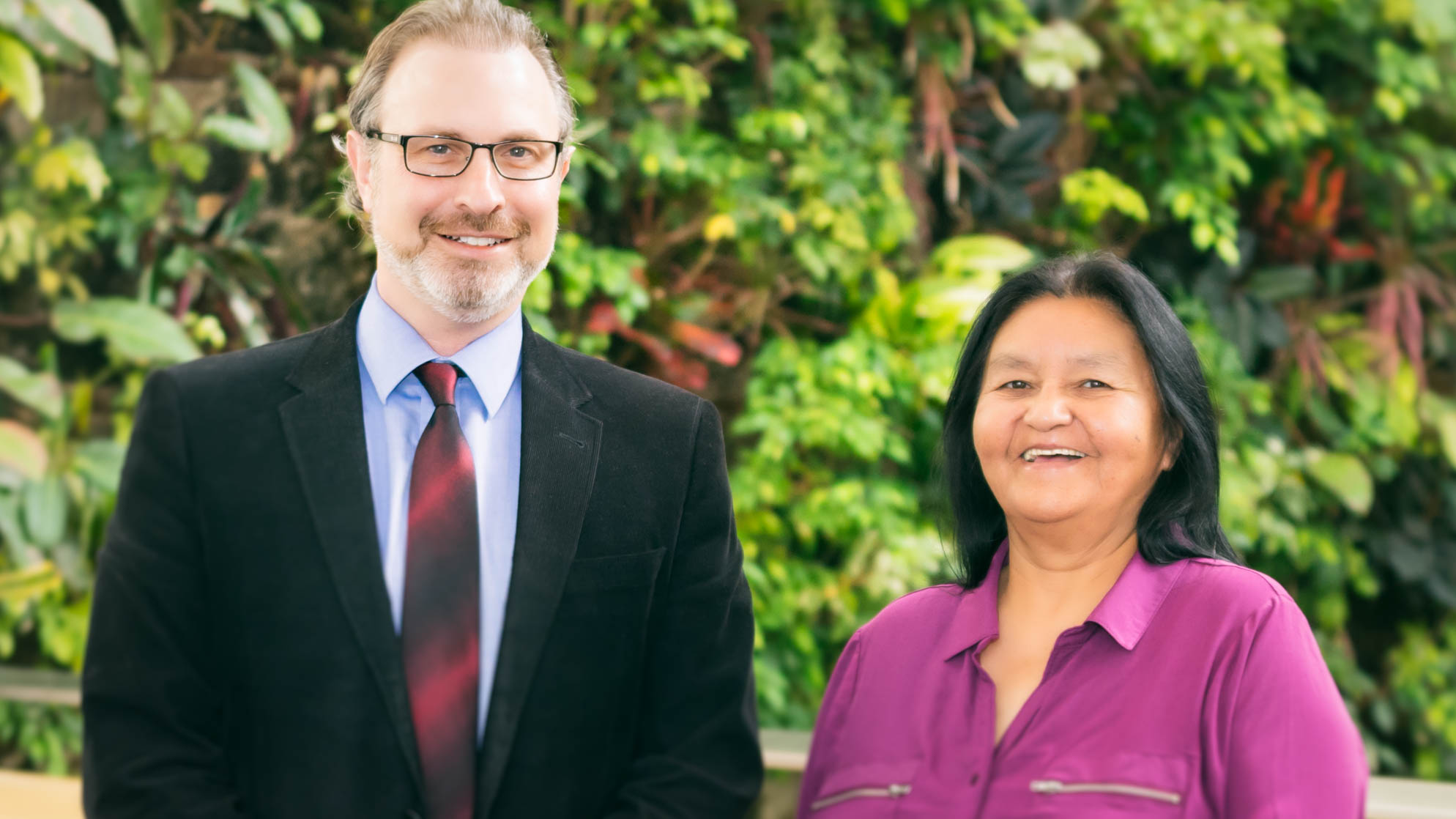- Future Students
- Current Students
- Faculty
- Staff
- Alumni
- Others
The legacy of residential schools and the power of traditional healing

Arlene Faries (left) stands with Dr. David Danto, Program Head of Psychology at the University of Guelph-Humber.
The smell of sage wafted through the room as Arlene Faries lit a bundle of herbs for a smudging ceremony. She stood before a group of students and faculty at the University of Guelph-Humber and waved the smoke around her body before thanking everyone for coming to hear her speak. For three years, she has been working with Program Head of Psychology, Dr. David Danto’s annual Psychology field study course when they visit Moose Factory in northern Ontario. Now she was on campus to tell her story. That afternoon she spoke about how she became a counsellor and how every day she works firsthand with the consequences of residential schools.
“I want to tell you what it’s been like,” she said. “I want people to understand what Native people in Canada have been through since first contact.”
Arlene started by charting out how more than 500 years of colonization have affected Indigenous peoples in Canada. She spoke of the violence, dispossession and cultural genocide that killed millions and culminated in the Canadian government’s decision to end the “Indian problem” by forcing Indigenous peoples to assimilate into Western culture. A major component of this plan was forcing Indigenous children to attend residential schools, taking them away from their families and communities. In residential schools, children were required to adopt Western customs, Christian faiths and were punished for speaking their native languages — physical, verbal and sexual abuse was also rampant. Overall, more than 150,000 children were taken from their homes and sent to residential schools.
The traumatizing effects of the schools passed through generations and have endured long since the last school was closed in 1996. While Arlene herself didn’t attend one of the schools, much of her family, including both her parents, did. None of them liked to talk about it much, but it affected them deeply.
“Every one of my clients is a residential school survivor, even if they’re one, two or three generations removed.”
“They would speak to us in Cree, but didn’t let us speak it back to them,” Arlene says. “If we asked why, my mother would say, ‘I don’t want you to go through what I went through,’” and recounted that at a residential school, her mother would be stabbed in the tongue with a pin if caught speaking Cree.
Arlene says that generations of abuse and mistreatment have left serious and lasting scars on Indigenous peoples which have led to behaviors often seen in oppressed people. Substance abuse, dysfunction in families and suicide are all significantly more common for Canada’s Indigenous communities. Arlene says she felt those problems herself, and would sometimes run away to avoid abuse and her mother’s violent temper. Eventually, she became addicted to drugs herself.
“That’s what I grew up with, I grew up surrounded by pain,” she said. “I was angry and hated everyone, so I numbed myself for so long that I forgot how to feel.”
Eventually, in working to overcome a personal crisis, Arlene decided to change her life and reconnect to her Cree culture and history. She enrolled in Canadore College’s Indigenous Wellness and Addictions program and trained to became a counsellor. Since then, she’s been working in Moose Factory, trying to heal the wounds of her community and its people.
“Every one of my clients is a residential school survivor, even if they’re one, two or three generations removed,” she said.
Despite the magnitude of the problem, Arlene feels there’s a clear path towards healing and reconciliation. Canada’s Indigenous peoples need to speak out about how they are treated and recover the traditions and culture that were taken from them.
“We need to revive our spirituality, relearn traditional systems and change how we raise our children,” she said. “These things, our ceremonies and stories, are still inside of us, in our blood, we just need to find them again.”
Learn more about Psychology at the University of Guelph-Humber.

